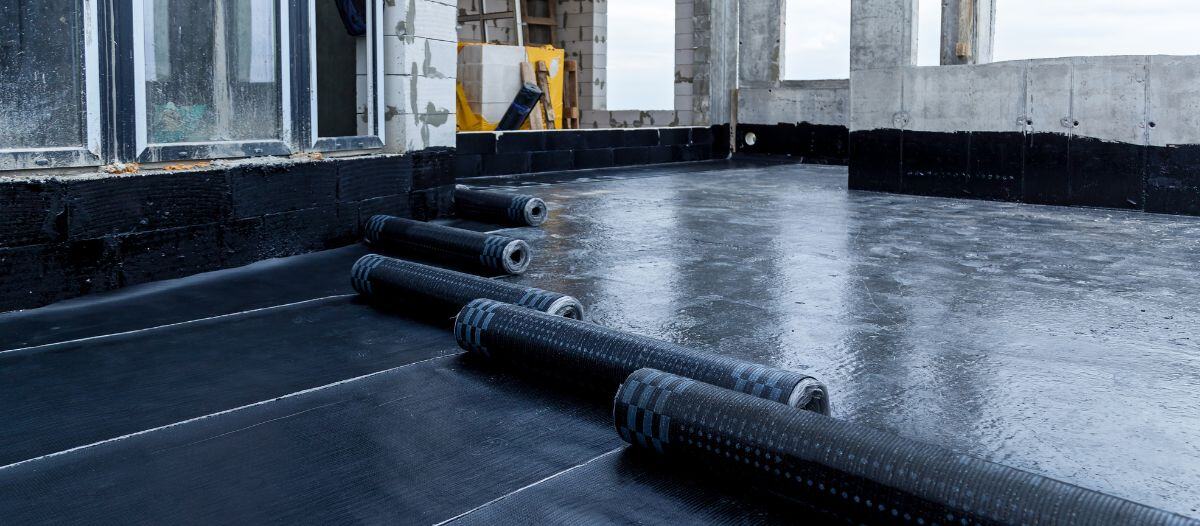The Middle Man
The advantage of using a consultant for roof & pavement projects

When starting roof and pavement projects, facility managers often face the choice between collaborating directly with manufacturers and contractors or involving a consultant. While working directly with manufacturers and contractors may seem more straightforward, there are several advantages to using a consultant for these types of projects that can contribute to the success of roof and pavement projects.
Expertise & experience
The most qualified professional consultants bring a wealth of knowledge and experiences, thanks to their extensive involvement in a multitude of projects across diverse industry sectors and product lines. This vast exposure has not only enabled them to gather invaluable insights but also to hone their skills and expertise, making them specialists in their field. In the context of roof and pavement construction, they have an intimate understanding of the intricate details and multifaceted complexities that such projects entail. They are adept at navigating these challenges with ease and efficiency. Additionally, they stay abreast of the latest trends and cutting-edge technologies in the industry, ensuring their methodologies and approaches are always up to date and in line with best practices.
Manufacturers, on the other hand, may have a more narrowed focus, specializing primarily in the production of materials. Their expertise lies in creating high-quality products that meet industry standards. Undoubtedly, they possess an in-depth understanding of their specific products, including their properties, benefits and applications; however, this specialized knowledge may not extend to the broader aspects of a construction project. Unlike consultants who have a more holistic view, manufacturers might lack comprehensive knowledge about project management, design considerations and construction best practices. Their expertise is often limited to the manufacturing process of those products they manufacture, which may not encompass the overall life cycle of a construction project. This could potentially limit their ability to provide the wide-ranging advice and guidance that consultants are adept at offering. There are a limited number of solutions available in a given manufacturer’s portfolio of products, whereas a consultant can cast a wider net without limitations or biases when making recommendations to a client.
Working exclusively with a contractor can also present certain limitations, particularly in terms of project scope and innovation. Contractors are typically focused on the execution phase, prioritizing timelines, budgets and the practical aspects of construction. While these are undoubtedly critical elements, this focus can sometimes lead to a limited view of the project, where innovative solutions or alternative methodologies that could enhance the project’s outcome are overlooked. Without the broader perspective that a consultant provides — which includes a strategic approach to utilizing the latest materials, technologies and sustainable practices — there is a risk that the project may not achieve its full potential in terms of efficiency, cost-effectiveness or longevity. This narrow approach may also stifle the opportunity to address future needs or challenges proactively, leading to additional costs or modifications down the line.
Objectivity & independence
Consultants are independent entities who can provide unbiased expert advice. Their recommendations are tailored based on a comprehensive analysis of a project’s unique requirements, the environmental factors at play, budgetary constraints and long-term sustainability goals. This broad-based, objective approach enables them to provide well-rounded advice that encapsulates all aspects of the project, from the selection of materials and techniques to cost optimization and risk mitigation strategies.
Choosing between a product- or material-only solution and a comprehensive approach ( that considers all key elements for a successful and sustainable outcome) involves leveraging insightful design, tailored high-quality materials, skilled installation and diligent oversight throughout construction. Consultants also have a unique vantage point of reinspecting systems that they designed and specified over the entire service life of the given system. This provides invaluable historical data on the actual life spans of systems. The operational context and environmental factors at a client’s site naturally influence a system’s performance.
On the contrary, manufacturers are inherently biased towards their own products. Their primary goal is to produce and sell their materials, which can inadvertently lead to a skewed perspective when providing solution-based recommendations. These recommendations are often influenced by factors such as their sales targets or current inventory levels, which may not necessarily align with the unique needs, constraints and objectives of a facility’s specific project.
For instance, a manufacturer might recommend a roofing material that they currently have in abundance in their inventory, even if other materials in the market are more suited to the project’s climate conditions, aesthetic preferences or budgetary constraints. They may also recommend a particular material based solely on their relationship with a “favorite” contractor and that contractor’s competitive niche.
Moreover, manufacturers focus on showcasing their products in the best light to increase sales. They may downplay any limitations or drawbacks of their materials or fail to mention superior alternatives offered by competitors. This lack of objectivity can result in suboptimal choices for a roof project, potentially compromising its quality, durability and overall success.
While contractors play an indispensable role in the execution phase, their focus is primarily on project completion based on predefined specifications and timelines. This inherent objective can sometimes overshadow the exploration of alternative solutions or more cost-effective approaches that don’t directly align with their immediate scope of work or financial incentives. The nature of their business — prioritizing project turnover and efficiency — might not always leave room for the thorough evaluation of materials or methodologies that could potentially benefit the project in the long term. Consequently, without the impartial oversight that consultants offer, the decision-making process may lean more toward convenience or profitability for the contractor rather than optimality and innovation for the project. This lack of neutrality can subtly influence project outcomes, resulting in missed opportunities for enhanced project value, sustainability or adaptability to future needs.
Comprehensive services
When choosing solutions for paving or roofing projects, various key factors come into play. These encompass evaluating the local climate for durability, analyzing traffic patterns for structural integrity, ensuring compliance with building codes, considering environmental impacts and aligning with client requirements. These elements are vital in determining the most effective approach for successful project completion, and this is another area where having the right third party on the team can make a big difference.
While manufacturers provide valuable insights into their products, their focus is mainly on supplying materials. This could result in coordination challenges if comprehensive project management services are not offered, potentially leading to coordination issues and inefficiencies.
Contractors, essential for project delivery, may not cover comprehensive services that span the entirety of the project life cycle. This means that clients might need to seek out additional professionals for these critical components, leading to potential fragmentation and inconsistency in the project's execution and ultimate quality. Additionally, the contractor's focus on the immediate task at hand could result in a missed opportunity for integrating innovative approaches or sustainable practices that could enhance the project's value and longevity.
Consultants offer a wide array of services, from project planning and design to quality control and post-construction support. They can manage the entire project lifecycle, ensuring consistency and efficiency at every stage. Their expertise in various aspects of construction, including design, materials selection, project management and risk assessment, ensures a comprehensive and well-rounded approach to delivering successful projects.
Cost savings & risk mitigation
By leveraging their industry connections and negotiation skills, consultants can deliver project documents that foster competitive pricing (both labor and materials), resulting in significant cost savings. Moreover, their meticulous project management can minimize delays and errors, further reducing costs. Consultants can also identify potential risks, devise strategies to mitigate them and ensure compliance with safety standards and building codes, protecting clients and projects from legal issues.
Manufacturers, meanwhile, usually sell their products at fixed prices. Any mistakes or delays due to their limited project management capabilities could escalate costs. Also, they might not be equipped to handle risk management and compliance, exposing a project to potential hazards and liabilities.
Similarly, contractors usually work within tight timelines and may not have the expertise or incentive to evaluate alternative methods or materials that could result in cost savings. Focusing on project execution, contractors may overlook potential risks that could arise due to inadequate materials or techniques.
Streamlining project efficiency
Adopting an inclusive approach that involves key stakeholders — owners, consultants, manufacturers and contractors — can significantly enhance the quality and outcome of roof and pavement projects. This strategy leverages the expertise and insights of each party to optimize success from start to finish. Consultants provide broad industry knowledge, objective oversight and project management capabilities. Manufacturers offer deep product knowledge and insights into material innovations. Contractors bring hands-on experience with installation and project execution.
By creating a synergistic environment where each stakeholder’s perspective is valued and considered, projects can benefit from a holistic approach proactively addressing potential challenges. This collaboration enables the identification of the most suitable materials and methods that align with the project’s objectives, budget and timeline, ensuring that all solutions are maximizing a return on investment. Such a strategy not only smooths out the execution phase but also promotes accountability, as each stakeholder understands their role and contributions toward achieving the shared goal of project excellence.
This collaborative approach ensures that facilities receive optimal solutions tailored to their needs. It’s a win-win, providing facilities with durable, cost-effective and sustainable solutions.

Casey Curry, RRO, a staff consultant at Benchmark since 2021, has been active in the roofing industry for more than 20 years. As a Certified Level I Infrared Thermographer, Curry employs advanced technology to detect trapped moisture and thermal loss in facilities. He is also a Registered Roof Observer and troubleshoots roofing and building envelope issues and develops comprehensive roof asset management programs for large, national clients
Read more on Operations & Maintenance and Project Management
Explore All FMJ Topics








